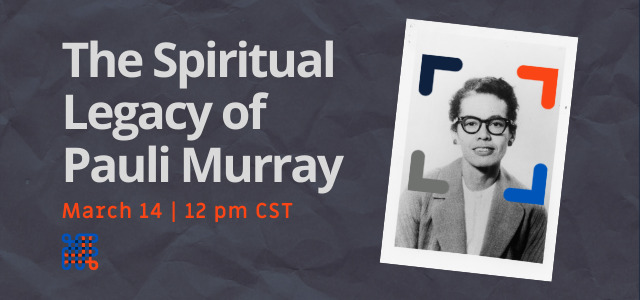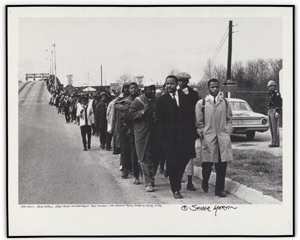
John Lewis (right), Hosea William, Albert Turner and Bob Mants leading marchers over the Edmund Pettus Bridge on Bloody Sunday, 1965. Photo courtesy of National Archives at College Park.
Commemorating Bloody Sunday: The Vote Is Sacred
March 4, 2022
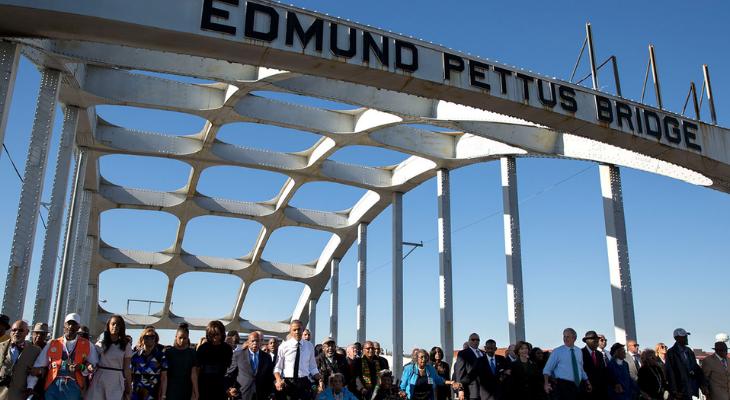
On a bright sunny day in March 2015, I sat at the base of the Edmund Pettus Bridge to join hundreds of people to pay tribute to the 50th Anniversary of Bloody Sunday, that historic day when a brave crowd composed largely of people of faith withstood police beatings and dog bites to secure the sacred right of this country’s African-American citizens to vote. John Lewis helped lead the original Bloody Sunday march and led the way again for the 50th anniversary commemoration.
Thanks to the bravery of Lewis, the Bloody Sunday marchers, and their compatriots across the civil rights movement, a lot changed over those 50 years. Many more people from all over nation became involved in the civil rights movement, starting with the successful march from Selma to Montgomery that followed Bloody Sunday. Black enfranchisement expanded exponentially. Immigration from nations of the developing world increased rapidly. Movements from women’s rights to LGBTQ rights were born.
But since that 2015 celebration, it’s started to feel like we’re moving backwards when it comes to voter enfranchisement. The current onslaught of state sanctioned obstruction to voting rights, especially for Black Americans, has started to feel like some are trying to push us back to the decades prior to the original Selma to Montgomery march. It’s this specter – the threat to positive lasting change on voting rights — that has compelled IFYC to launch the Vote Is Sacred Project.
What Changed for the Better?
John Lewis and his fellow activists in pursuit of justice did not allow the police beatings and dog bites to deter their efforts to secure the vote for Black people in Alabama, throughout the South and across the nation. Lewis and his compatriots bore witness to the benefit of their efforts with the passage of the Voting Rights Acts of 1965 and the subsequent enfranchisement of literally millions of Black Americans.
Share
Related Articles
American Civic Life
Interfaith America Interview
American Civic Life
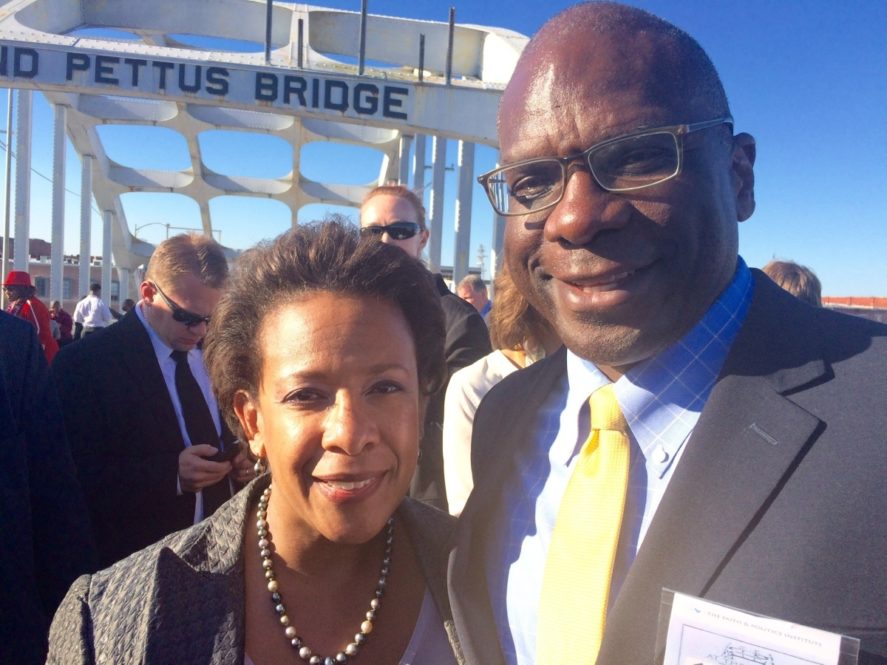
The Rev. Fred Davie and former U.S. Attorney General Loretta Lynch at the 50th anniversary commemoration. Photo courtesy of Rev. Davie
This increased electoral participation led to the election of hundreds of Black public officials, including John Lewis’s election to the US Congress and the election of President Barack Obama to the White House. In a particularly poignant moment, Obama, who joined Lewis at the Edmund Pettus Bridge for the 50th Anniversary, paid homage to the blood that had been shed on the path to the election of the country’s first Black President. President Obama said on that day of commemoration:
“Because of campaigns like this, a Voting Rights Act was passed. Political and economic and social barriers came down. And the change these men and women wrought is visible here today in the presence of African Americans who run boardrooms, who sit on the bench, who serve in elected office from small towns to big cities; from the Congressional Black Caucus all the way to the Oval Office.”
“Because of campaigns like this, a Voting Rights Act was passed. Political and economic and social barriers came down. And the change these men and women wrought is visible here today in the presence of African Americans who run boardrooms, who sit on the bench, who serve in elected office from small towns to big cities; from the Congressional Black Caucus all the way to the Oval Office.”
Also present that day was former President George W. Bush, who had signed a renewal of the Voting Rights Act while in the White House That seemingly bipartisan approach for voting rights (now sorely missing) was in evidence at the 50th anniversary celebration. Indeed, seated to my immediate left that day (somewhat ironically) was Republican Jeff Sessions, then Alabama’s attorney general. Two seats to my right were the daughter and son-in-law of President Lyndon B Johnson, who signed the original Voting Rights Act into law. It was a bipartisan American moment in support of a right to vote so sacred people that have been willing to die for it.
What Hasn’t Changed
Today over 49 state legislatures in the U.S. have introduced some form of voter restriction legislation. Fourteen states have enacted voter suppression laws; at least a half dozen are nothing short of draconian. This is the context for IFYC’s launch of its The Vote Is Sacred Project.
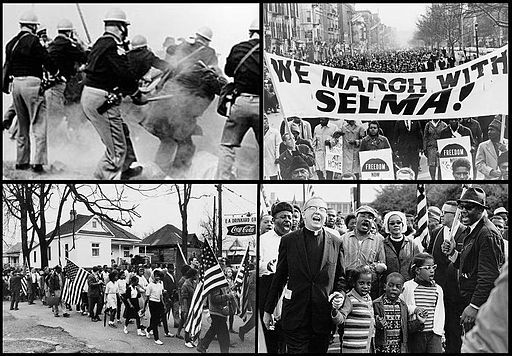
Top left: Alabama police attack Selma to Montgomery marchers, known as “Bloody Sunday,” in 1965. Top right: Marchers carrying banner “We march with Selma!” on street in Harlem, New York City, New York in 1965. Bottom left: Participants in the Selma to Montgomery march in Alabama during 1965. Bottom right: Dr. Martin Luther King, Dr. Ralph David Abernathy, their families, and others leading the Selma to Montgomery march in 1965. Mitchumch/Wikimedia Commons
The Project is born of the blood and the spirit of John Lewis and his fellow patriots. It captures the faith foundation and interfaith engagement that characterized the struggle for the vote. The Project also builds on the value of coalitions of civic organizations mobilizing to advance unobstructed access to the ballot. As college students played a significant role in voting efforts of the past, IFYC will deploy its extensive college and university networks to recruit and train interfaith cohorts of students to engage historically marginalized voters and support secure pathways to the ballot box.
IFYC’s the Vote Is Sacred centers the rich interfaith history in the U.S. to secure the vote for Black Americans and re-establishes the interfaith experience as a foundation for advancing voting rights in this age, especially among young, religiously and ethnically diverse college students who will engage religiously and ethnically diverse voters. This religious and cultural diversity extends to Black communities in the U.S., as more and more first and second generation Black Americans hail from the countries of Africa or nations of the Caribbean. The recent voting restrictions in the U.S. are in part a response to new Americans of color, and in particular the ever-enhancing participation of Black and Brown Americans in the civic life of America.
The Vote is Sacred Project of IFYC is an important emerging antidote to this modern-day voter suppression. As such it is a fitting legacy of the bravery and spirit of Bloody Sunday. The Vote is Sacred, combined with numerous other efforts engaging the growing numbers of Americans determined to protect the right to vote, offers hope that we can get this country back on track when it comes to ensuring that every citizen of this country has the free and unfettered right to choose their government by casting their vote.
IFYC’s Vote is Sacred Project had its first panel discussion in January 2022 with the Rev. Tyrone McGowan from IFYC moderating a panel that included the Rev. Adam Russell Taylor, Rabbi Sandra Lawson, Dr. Simran Jeet Singh, Vanessa Gomez Brake, and Imam Mohamed Magid.
Join us for our next webinar on a Black Interfaith leader, Pauli Murray, on March 14!
